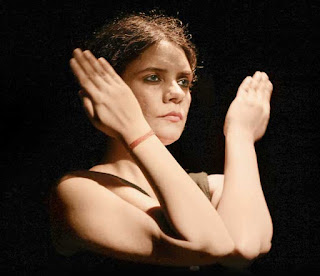Monologues
plus vagina- Times of India
TNN | Mar 6, 2016,
It is probably the
boldest, most bruising play on marital rape and oppression ever on Indian
stage. Shilpi Marwah in A Woman Alone doesn't flinch from the crudities. But
despite the pitch-black humour, the Hindi adaptation of the play by Dario Fo
and Franca Rame has become a cult play in just eight months.
Every time it is staged Marwah's onewoman act,
adapted by director Arvind Gaur, has drawn full houses; tickets, on the odd
occasion were selling in black. The first time Marwah, 26, went up on stage in
Delhi, she says she was braced for the outrage. After all, this was a play that
Gaur, head of Asmeeta Theatre, had spent nearly 20 years trying to cast and
been rejected as "too much".
"It
was that direct about sex," she says. At one point, the protagonist, imprisoned
at home by a violently obsessive husband, compares his brutish lovemaking to
"zameen main paani ke liye boring karne wali machine ki tarah."
Marwah
needn't have worried. When she winds up the hour-long play, pulling down an
overhead set hung with household miscellanea on herself, the response is
stunned silence, and finally, standing ovation. The solo sketch has now
travelled to several theatres and colleges -- including one run by
missionaries. Only one principal of a woman's college has huffed her way out of
the hall in indignation, but her students loved it and so did the teachers.
A
solo is a terrifying act to pull off but it packs the most punch in theatre and
allows an actor to evolve along with it over time. An increasing number of
young female actors are now going it alone on stage, telling some of the most
forceful stories of our times. Maya Krishna Rao's wildly popular Walk created
post-Nirbhaya, Mallika Taneja's Thoda Dhyan Se, Jyoti Dogra's Notes on Chai,
Ira Dubey's 9 Parts of Desire, Kalki Koechlin's Just Another Rant, Seema
Pahwa's Saag Meat and Poornima Shettygar's Truck are some of the finest
examples of this growing mono theatre.
Mumbai-based
Dogra's Notes on Chai has been drawing packed houses nearly every one of the 45
shows over the last two years across India. At NSD's recently concluded theatre
festival, Bharat Rang Mahotsav, it was on the list of must-see plays for many
drama lovers. The 100-minute solo is an unscripted piece of theatre where Dogra
uses inane, everyday chatter around us in homes, buses, markets to get to the
core of what the words actually say of our fears, inhibitions and anxieties.
And you laugh, because you catch sight of yourself in these funny, pathetic
vignettes on love, sex, body image, health and religion.
"We have an existential need to make
sense of our lives. Take the woman who wakes up, cooks, takes a bus to office,
works, comes home, picks up vegetables, reaches home, cooks... The days and
months that pass like this in repetitive circles, we all have need to make some
meaning of them," says Dogra. She uses her training in Tibetan chanting,
voice modulation and understanding of sound to interpret the real meaning
behind a piece of vacuity like: "Yes I am happy. Why you ask?...I mean we
have to be happy, na?"
And
if you thought that a devised work like this works only in urban theatre
spaces, consider this: Dogra has taken her play to Bhopal, Patiala, Amritsar,
Trissur and Kochi without diluting even the graphic passages.
Apart
from acting skills, it takes a lot of nerve to hold an audience alone,
especially when the script defies convention. Marwah has spent eight years
doing street theatre in Delhi, a lot of it political — she was among the young,
unflinching female voices on the street after the December 16 gang-rape. She
also scripted a 20-minute solo, Purity, on the whole mystique around a woman's
virginity. "All that had trained me well enough for A Woman Alone. But
even then there was a point when I would ask Arvind sir hesitantly: 'Iske liya
koi aur shabd ka istemal kar sakte hain kya?'" she recalls with a laugh.
Gaur stuck to his guns. "It is obvious that Indian society is ready for a
free and frank discussion on sexuality, especially the young," he says.
Actor Poornima Shettygar, 43, whose original
solo work Truck was first staged at Delhi's Alliance Francaise in November, has
a theory about gender inequality -- that men and women make for natural
collaborators and if it wasn't for cultural conditioning there wouldn't be a
battle of the sexes. So her "protagonist" is a truck, decorated with
tassles, bright colours and feminine accessories as trucks often are. "The
truck seems hyper-masculine but drivers often dress it up like a woman. That is
because it fills a kind of void in their life," she points out. The script
travels across several Indian states and Shettygar's lines touch eight
languages, tracing the roots of trafficking, combining humour, nautanki and
grim drama.
"To be up on stage alone, that is the
most dynamic way to connect with audiences. And you and the play can grow
forever," she says.
Malini.Nair@timesgroup.com
link- http://timesofindia.indiatimes.com/india/Monologues-plus-vagina/articleshow/51274461.cms

No comments:
Post a Comment